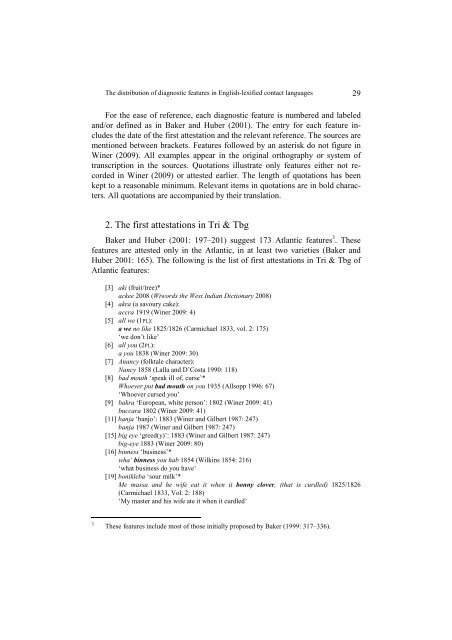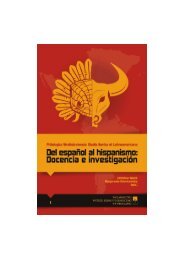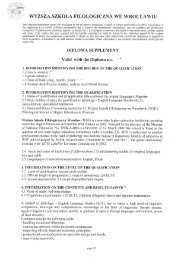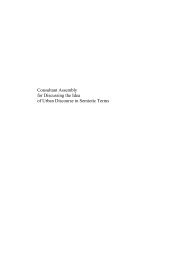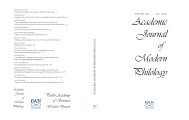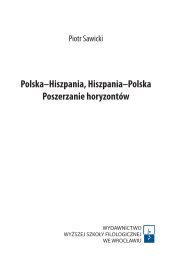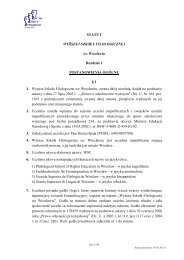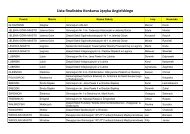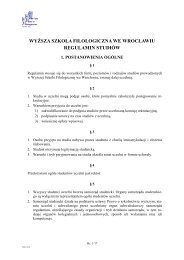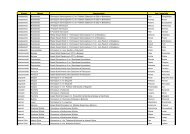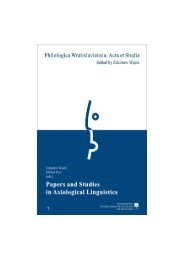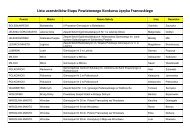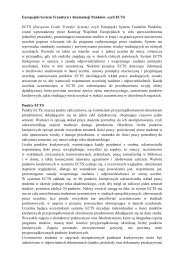s - Wyższa SzkoÅa Filologiczna we WrocÅawiu
s - Wyższa SzkoÅa Filologiczna we WrocÅawiu
s - Wyższa SzkoÅa Filologiczna we WrocÅawiu
You also want an ePaper? Increase the reach of your titles
YUMPU automatically turns print PDFs into web optimized ePapers that Google loves.
The distribution of diagnostic features in English-lexified contact languages 29<br />
For the ease of reference, each diagnostic feature is numbered and labeled<br />
and/or defined as in Baker and Huber (2001). The entry for each feature includes<br />
the date of the first attestation and the relevant reference. The sources are<br />
mentioned bet<strong>we</strong>en brackets. Features follo<strong>we</strong>d by an asterisk do not figure in<br />
Winer (2009). All examples appear in the original orthography or system of<br />
transcription in the sources. Quotations illustrate only features either not recorded<br />
in Winer (2009) or attested earlier. The length of quotations has been<br />
kept to a reasonable minimum. Relevant items in quotations are in bold characters.<br />
All quotations are accompanied by their translation.<br />
2. The first attestations in Tri & Tbg<br />
Baker and Huber (2001: 197–201) suggest 173 Atlantic features 3 . These<br />
features are attested only in the Atlantic, in at least two varieties (Baker and<br />
Huber 2001: 165). The following is the list of first attestations in Tri & Tbg of<br />
Atlantic features:<br />
[3] aki (fruit/tree)*<br />
ackee 2008 (Wiwords the West Indian Dictionary 2008)<br />
[4] akra (a savoury cake):<br />
accra 1919 (Winer 2009: 4)<br />
[5] all <strong>we</strong> (1PL):<br />
a <strong>we</strong> no like 1825/1826 (Carmichael 1833, vol. 2: 175)<br />
‘<strong>we</strong> don’t like’<br />
[6] all you (2PL):<br />
a you 1838 (Winer 2009: 30)<br />
[7] Anancy (folktale character):<br />
Nancy 1858 (Lalla and D’Costa 1990: 118)<br />
[8] bad mouth ‘speak ill of, curse’*<br />
Whoever put bad mouth on you 1935 (Allsopp 1996: 67)<br />
‘Whoever cursed you’<br />
[9] bakra ‘European, white person’: 1802 (Winer 2009: 41)<br />
buccara 1802 (Winer 2009: 41)<br />
[11] banja ‘banjo’: 1883 (Winer and Gilbert 1987: 247)<br />
banja 1987 (Winer and Gilbert 1987: 247)<br />
[15] big eye ‘greed(y)’: 1883 (Winer and Gilbert 1987: 247)<br />
big-eye 1883 (Winer 2009: 80)<br />
[16] binness ‘business’*<br />
wha’ binness you hab 1854 (Wilkins 1854: 216)<br />
‘what business do you have’<br />
[19] bonikleba ‘sour milk’*<br />
Me massa and he wife eat it when it bonny clover, (that is curdled) 1825/1826<br />
(Carmichael 1833, Vol. 2: 188)<br />
‘My master and his wife ate it when it curdled’<br />
3<br />
These features include most of those initially proposed by Baker (1999: 317–336).


